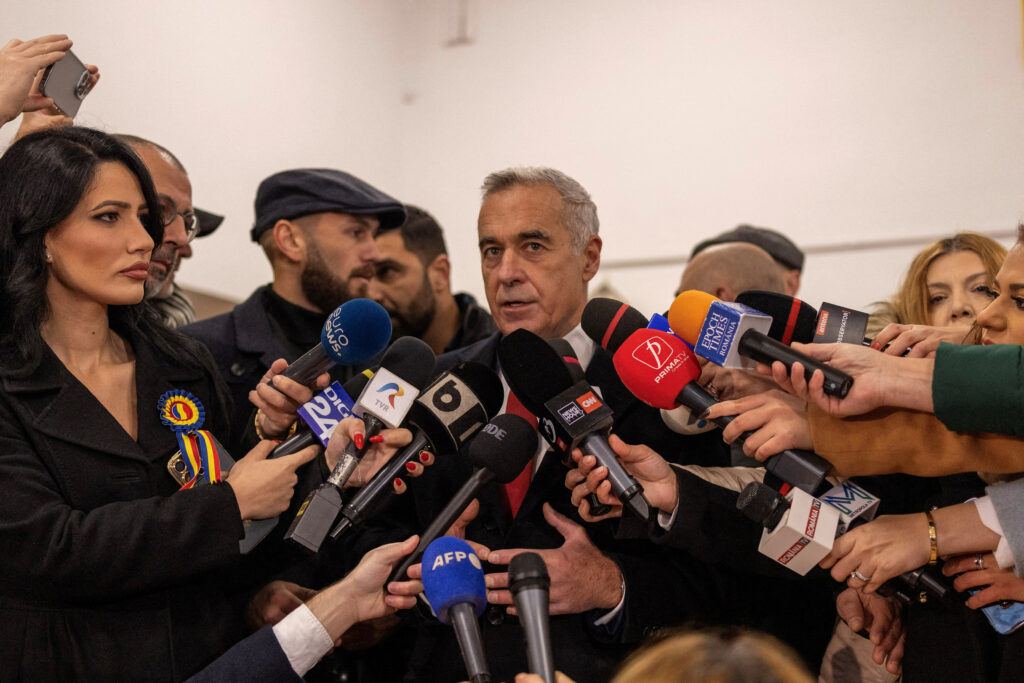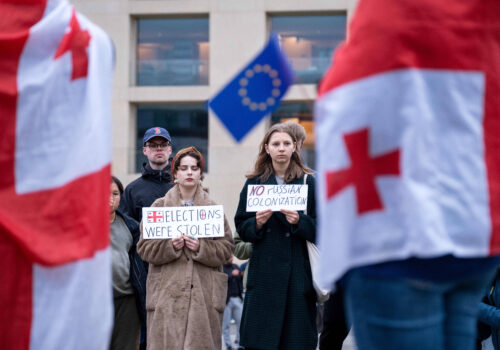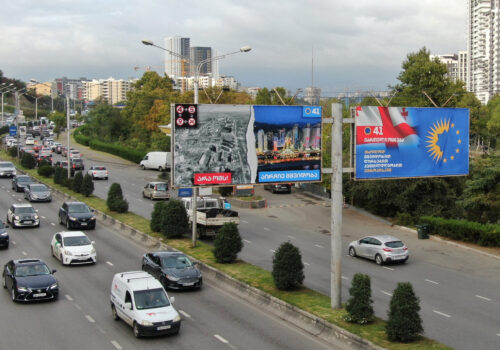Instead of a runoff, they’ll have a rerun. On Friday, Romania’s Constitutional Court annulled the results of the country’s first-round presidential election, in which dark horse candidate Calin Georgescu won the most votes. The court’s order that the presidential electoral process must be “entirely redone” comes after Romanian President Klaus Iohannis declassified intelligence reports alleging a Russian interference campaign geared toward benefiting Georgescu on TikTok and Telegram.
What are the next steps for Romania’s presidential race after this unprecedented ruling? And what are its implications for the country’s democracy? Our experts answer six burning questions below.
1. Why was the presidential election nullified?
This decision is historic and unprecedented. The Constitutional Court of Romania unanimously made the decision on the basis of Article 146 (f) of the Constitution concerning the legality and correctness of the presidential electoral process, with the court’s decision today stating that the “entire electoral process will be integrally redone.” The rollout of the decision was somewhat fumbled, as it became public while polling stations were already open for the diaspora in the second-round presidential election, and by the time the process was stopped, around 53,000 citizens abroad had already voted.
This binding decision from the court comes on the heels of rapidly developing information concerning state-sponsored interference in the electoral process and Russian hybrid activities, as well as accusations of campaign finance violations. The court made its decision stating that the integrity of the vote had been affected, as one candidate skirted the law in his campaign and benefited from unfair promotion. Continued clear communication from the authorities will be critical to provide information to a society that is feeling tense and exhausted after weeks of elections.
—Anca Agachi is a defense policy analyst at the RAND Corporation and a nonresident fellow with the Transatlantic Security Initiative in the Atlantic Council’s Scowcroft Center for Strategy and Security.
It’s never a good thing when an election is nullified. In this case, Romania’s Constitutional Court appears to have acted on the basis of information regarding Russian interference on behalf of Georgescu. Romanian society appears divided in its reaction, with even the liberal opposition leader, Elena Lasconi, Georgescu’s opponent in the presidential race, criticizing the decision. Demonstrations could follow in what seems to be a highly charged political environment. Romania’s December 1 parliamentary elections, however, are not affected by the decision. The new Parliament should be seated around December 21 and will be in a position to create a new government.
—Daniel Fried is the Weiser family distinguished fellow at the Atlantic Council and a former assistant US Secretary of State for Europe.
The decision to annul the first round of Romania’s presidential election revolves around declassified documents from the country’s intelligence services that allege that a coordinated campaign promoted pro-Russian candidate Georgescu to unexpectedly garner the largest percentage of the vote on November 24.
Those allegations, which have not been proven beyond what has been published by Romania’s security services, include a coordinated campaign across social media platforms such as Telegram, Facebook, and, most importantly, TikTok that gave would-be voters the assumption that Georgescu was a more prominent candidate than had been expected before the November 24 vote. Hashtags associated with the ultranationalist candidate gained significant visibility on TikTok in the days ahead of the first round vote, and the country’s authorities subsequently asked the European Commission to look into the irregularities under the bloc’s newly passed social media laws.
A lot remains uncertain. While the Atlantic Council’s own analysis of TikTok and Telegram found significant amounts of coordination to promote Georgescu to the widest online audience possible, much of this activity was completely legal under Romania’s election laws. Claims that online influencers were paid to champion the candidate’s causes—and did not disclose those payments under campaign financing rules—do fall into the category of potential illegal behavior.
It’s unclear whether social media significantly altered voters’ choices in this particular election. Repeated studies have demonstrated that people’s access to digital platforms like TikTok represent only a part of a wider media diet, including access to traditional media and discussions with friends and family, that contributes to how they eventually decide to vote. What we do know is there is clear evidence that Georgescu’s campaign was promoted heavily by often clandestine activity across multiple social media platforms in ways that, while opaque, were mostly legal, based on what has been disclosed by local authorities and via the Atlantic Council’s own analysis.
—Mark Scott is senior resident fellow at the Digital Forensic Research Lab’s (DFRLab) Democracy + Tech Initiative within the Atlantic Council Technology Programs. He was previously the chief technology correspondent for Politico.
2. What does this incident tell us about the resilience of democracy in Romania?
We just experienced a near-miss in the heart of NATO. Romania, a NATO ally for two decades with a record of democratic integrity, almost had a presidential election stolen by foreign intervention. The good news is that Romania’s democracy proved itself to be sufficiently robust and resilient to prevent this interference from having a decisive impact—though the final outcome of the rescheduled elections will ultimately determine that.
The alleged interference also underscores the power of social media, how vulnerable tech platforms are to manipulation, and how significant this can be to the future of democracy. Much thought and action is urgently needed to ensure that social media is channeled and structured so that it enhances the vibrancy of democracy rather than becoming a weapon to undermine it.
—Ian Brzezinski is a senior fellow at the Atlantic Council and a former US deputy assistant secretary of defense for Europe and NATO policy.
The next days, weeks, and months will be critical to ensuring that Romanian democracy has long-term prospects of not only survival, but recovery. This election season comes on the heels of massive structural challenges, such as endemic distrust in state institutions and socioeconomic issues, such as cost of living hikes and brain drain. Another major challenge for the country is corruption, which led to a sizable anti-system vote in both the presidential and parliamentary elections and provided a fertile ground for far-right parties and for malicious interference activities.
On top of these structural challenges, there were issues with the authorities’ communication in the aftermath of the presidential election. The public experienced a whiplash in the Constitutional Court’s decisions as to whether the presidential election can proceed to the second round. The government’s communication was inconsistent concerning the fate of the presidential election, the role played by state-sponsored actors, and Russia’s role in influencing the process (including if and how these factors influenced the actual voting result). Meanwhile, jockeying among domestic political parties has created tension and deepened distrust in society.
Notably, nongovernmental organizations, the media, and other civil society groups rose up to fill the void in an essential and constructive fashion. For instance, a media investigation uncovered links between the Kremlin and pro-Georgescu Romanian influencers. And it was civil society organizations that asked for the declassification of Supreme National Council of Defence documents pertaining to election interference. The information this kind of engagement has uncovered has been like oxygen to a society holding its breath.
—Anca Agachi
3. Who is in charge of managing this issue now, and what can we expect from the key players in the election and society at large?
This will be a whole-of-government effort, likely spread across the newly elected (and fragmented) Parliament with responsibility over legislation and choosing the new prime minister, Iohannis (who will remain in power until a new president can take the oath of office following elections), relevant authorities with responsibilities for resilience and security, electoral authorities, and probably the judicial branch as well.
Ideally, their focus will be on three things: 1) Build national unity in the face of far-right and anti-Euro-Atlantic forces. 2) Take action to inspect and secure critical vulnerabilities from further foreign interference. 3) Investigate the causes that led to this outcome, especially the details of the interference effort, potential collusion of those who may have benefited from it, and any responsibility of Romanian authorities in the slow identification of coordinated campaigns to influence the vote.
Elected officials will play a critical role in communicating with the public regarding what lies ahead until the elections can be held again (likely in March), given the tension that exists in society already, massive gaps in information concerning this unprecedented decision, its implications for the country, and the challenges posed by foreign interference. However, as the entire presidential election process will be restarted, a lot of attention will be focused domestically on the repositioning of candidates and political blocs.
—Anca Agachi
The new Parliament will support a new government. The current president may continue in office until his successor is elected but may also resign, in which case the new president of the Senate will become interim president. One wild card is whether supporters of Georgescu will mount protests and whether these can attract widespread support.
—Daniel Fried
4. What sort of government will emerge when the new Parliament convenes on December 21?
While predictions are uncertain, the pro-European parties appear to have formed a coalition and have a majority of votes in the Parliament. That said, the parliamentary and presidential elections indicated a strong anti-incumbency trend in Romania.
—Daniel Fried
5. What can we expect next from Russia?
We can expect Russian denunciation and a wave of (feigned) outrage. The Kremlin appears to support political extremes in Romania, as elsewhere, promoting through statements and trolls a narrative of Western oppression and domination of Romania, hoping that Romanians forget the long record of Kremlin-imposed communist rule that kept Romania poor and autocratic for two generations.
—Daniel Fried
6. What lessons should the United States and Europe take from this, and what should they do right now?
First, democratic resilience is an issue to be taken extremely seriously in Europe, not only because of what it means for domestic stability in transatlantic countries, but also given its implications for broader regional security and defense. Romania is a key NATO country in the southeast of the Alliance, and its internal political turmoil has broad implications for allied stability. Given the growth of far-right movements throughout Europe, the circumstances of this election should not be taken lightly.
Second, renewed attention should be paid toward deepening and expanding the national and transatlantic toolbox available to respond to hybrid incidents in a broader context of transatlantic adaptation in the aftermath of Russia’s war in Ukraine. We expect information to come out in the next few weeks about what exactly happened in Romania’s case, but whatever the findings may be, it is clear that broader resilience and operational capacity in hybrid responses will be critical to transatlantic security.
—Anca Agachi
Russia seeks to strengthen extremist politics and promote a sense of threat throughout Europe, using a variety of methods including information manipulation, support for extremist politics, economic pressure, sabotage, threats, intimidation, and, in the case of Ukraine, war. Those in Europe who thought that Russian aggression had nothing to do with them have discovered their error. Russia has not created political fissures in European countries (or the United States) but seeks to exacerbate and exploit them. The solution lies in resisting Russian pressure while working to address those social and economic problems that give rise to vulnerabilities. This is not a new challenge but a current manifestation of an older one, and some perspective can help guide a common response.
—Daniel Fried
Further reading
Tue, Nov 12, 2024
Russia emerges as the real winner of Georgia’s disputed election
UkraineAlert By
Critics say Georgia's October parliamentary elections were marred by widespread vote-rigging, but the success of the ruling Georgian Dream party is nevertheless a major victory for Russia that consolidates Moscow's position in the Caucasus region.
Thu, Nov 7, 2024
The West must respond to Russia’s rapidly escalating hybrid warfare
UkraineAlert By
Russia's hybrid war against the West is escalating rapidly and requires a far firmer collective response, writes Doug Livermore.
Thu, Oct 24, 2024
Moldovan and Georgian elections highlight Russia’s regional ambitions
UkraineAlert By
Russia is playing a key role in elections currently underway in Moldova and Georgia, underlining Moscow's determination to retain its regional influence despite challenges created by the invasion of Ukraine, writes Katherine Spencer.
Image: Independent far-right candidate Calin Georgescu speaks to the press after casting his vote on the day of the parliamentary election, in Mogosoaia, Romania, December 1, 2024. REUTERS/Alkis Konstantinidis.



